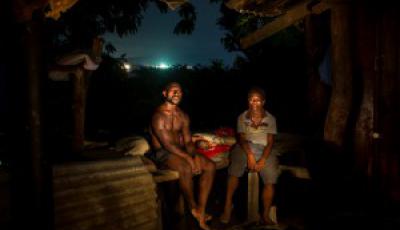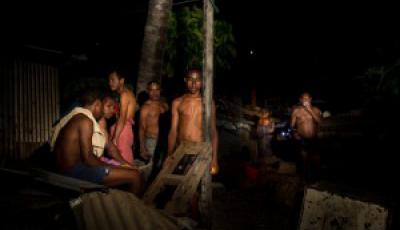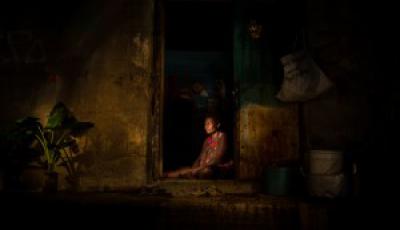The following guest post is written by Dr Kristian Lasslett, Lecturer in Criminology at the University of Ulster, and accompanied by photographs by Philippe Schneider from his project Where We Live Matters (please click on the photos to see them full size and resolution).
Refugees travelling by boat to seek asylum in Australia – ‘unauthorised maritime arrivals’ as the government calls them – have, over the past decade, become prime electoral fodder. Nowhere is this more apparent than in the lead up to the 2013 Federal elections in Australia. The opposition leader, Tony Abbott – whose party leads the opinion polls – has announced that if the Liberals win government asylum seekers rejected by a single government caseworker, will have no recourse to the courts. A noted conservative, Abbott’s devotion to the enduring institutions of liberal democracy seemingly excludes the rule of law. Former Liberal Prime Minister, Malcolm Fraser, slammed Abbott’s policy announcement: “There are no limits to which the opposition will not go to demonstrate inhumanity to people with a significantly demonstrated need.”
However the opposition’s abandonment of basic democratic principles has been equalled in tenor by the governing Australian Labor Party. In a carefully organised media event, the Prime Minister, Kevin Rudd, announced that ‘genuine’ asylum seekers would be resettled not in Australia, but neighbouring Papua New Guinea (PNG). This will include ‘unaccompanied minors’ with family members currently living in Australia.
A vibrant Melanesian nation – and former Australian colony – 85% of PNG’s seven million citizens live in rural areas, where kinship systems remain fundamental both to community self-organisation and to land title, in a country where land is 97% customarily owned (although 12% of PNG’s land-mass has been temporarily alienated through special agricultural business leases, many of which were fraudulently obtained).
This recent lurch right in Australia’s refugee policy, the public has been told, is necessary to deter those escaping persecution from making the potentially perilous trip to Australia. The government has been at pains to point out, lest we doubted them, that this policy is about saving refugee lives, not as some cynics have suggested, electoral engineering.
Minister for Employment and Workplace Relations, Bill Shorten, told the ABC’s Q&A program: “I think it's terrible to perpetuate a business model where a shonk in an unsafe ship can sell you a ticket which will mean that you or your family could drown … when I hear the discussion about compassion, it is not compassionate to hold out a proposition which will see so many people exploited by unscrupulous people and let them drown.”
Nevertheless, Papua New Guineans – not surprisingly – have taken particular exception at their country being viewed by Australian policy makers as a punishment hellish enough to deter those escaping war and extreme forms of political persecution. Anyone privileged enough to spend time in PNG’s urban and rural communities would know despite its terrible international wrap – contributed to by sensational news headlines – Melanesian culture is typified by hospitality. Indeed, the unassuming stranger is often treated with embarrassing kindness when traversing into PNG’s village areas; colourful community celebrations, the slaughtering of pigs and a delectable array of tropical garden treats are not uncommon sights for the visitor.
That said, for refugees being permanently resettled in PNG such experiences will be trumped or replaced by very practical challenges that will invariably emerge. These challenges stem largely from the country’s political economy.
As a national elite has found its feet over the past two decades, and entrenched itself in positions of power, the state has been gradually transformed into a lever for syphoning off revenues generated by PNG’s lucrative enclave industries – that centre on natural resource extraction – redistributing revenues into the pockets of small ‘robber-band’ cabals who seize positions of influence within government. The head of PNG’s anti-corruption agency labels this predatorial system of casino capitalism a ‘mobocracy’.
Whether it be formal inquiries into Finance, Lands or the Works department, the same themes appear; mismanagement at the highest levels, and illicit transactions which range from the trading away of state land for a bribe or defrauding the public purse of millions through illicit schemes of various complexity.
As a result of this criminogenic political economy, rural and urban citizens alike in PNG have had to organise themselves and their communities through informal governance structures, in the face of a parasitic elite, who has manifestly failed to offer any form of social stability. Informal bonds of solidarity that centre upon ethnic identity, kinship and custom – which themselves are evolving to encompass new interests and challenges – have proven critical. Indeed when besieged by senior government officials and their clients, communities can draw upon shared identities and strong customary bonds, to marshal a defence of local interests. Nowhere has this been more palpable than in a recent spate of forced evictions in the nation’s capital, Port Moresby.
Numerous settlements – a name given to unplanned communities which have developed over the last century, largely on state land – containing thousands of people, have been subjected to the threat of forced eviction. Each story is subtly different, but common themes include illegal land-transactions, the use of state violence to displace residents, and the resilience of victimised communities in the face of persistent attacks.





If housed through the formal housing sector, new arrivals will need substantial financial assistance from the PNG government to pay extortionate weekly rents. In lieu of this, most resettled refugees will have to join a settlement; without the lever of kinship, finding a secure space will be difficult. At best they will have to settle on the least desirable vacant land – like the West Papuans. Refugees will struggle to access basic services, and the threat of eviction will never be far away.


There is a common phrase in PNG: ‘land is life’. This statement has taken on renewed importance as successive governments raid the state coffers, leaving services and infrastructure in a parlous state. The land has provided the people, what the state and resource extraction industry have not, security, food, reliable income, and a home. Refugees without land will have no life; and at the moment no viable strategy exists for securing this vital resource for those escaping persecution abroad.
The violence of omission will replace for many refugees settled in PNG the commissioned violence they have fled.
Dr Kristian Lasslett is currently Lecturer in Criminology at the University of Ulster and a member of the International State Crime Initiative’s Executive Board. He is editor of the State Crime Testimony Project and joint editor-in-chief of State Crime. Kristian has conducted fieldwork in Australia, Papua New Guinea, and the United States, and has published papers on state crime and criminological theory in leading international journals. His first book, State Crime on the Margins of Empire is forthcoming with Pluto Press. Presently Kristian is carrying out research on forced eviction, corruption, and civil society in Papua New Guinea. Follow Kristian on Twitter.
Philippe Schneider was born in France in May 1967. After dabbling in student activism whilst completing a Bachelor of Arts and Communication at university, Philippe found his calling as a Humanitarian Aid Worker. He has been exposed to the spectrum of human existence whilst working in Iraq, Lebanon, Palestine, and Darfur. Philippe believes that the commentary of human experience can ideally be shared through the medium of photography and strives to create work that informs the social conscience. Find Philippe on Facebook, read more about his project, Where We Live Matters, or listen to this interview.
Want to start a discussion about this topic? Post a comment here or on our Facebook page. You can also tweet us.
__________
How to cite this blog post (Harvard style):
Lasslett, K and Schneider, P (2013) The Violence of Omission: Australia's Refugee Policy. Available at: http://bordercriminologies.law.ox.ac.uk/violence-of-omission (accessed [date]).
Share:








